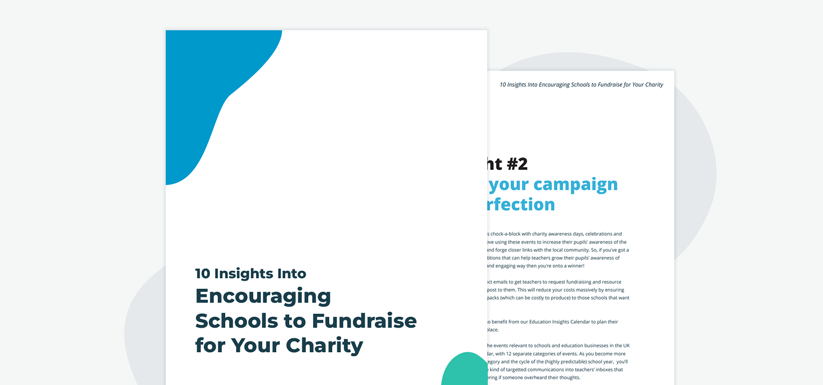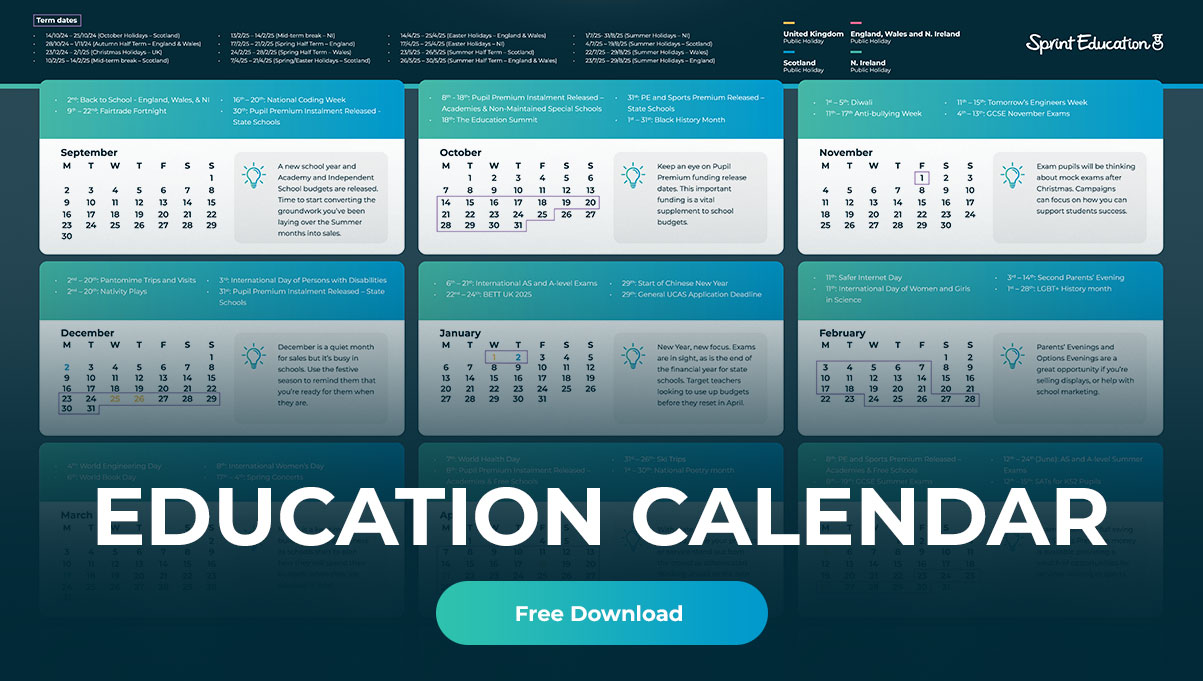14 Education Words that Boost Email Open Rates
14 Education Words that Boost Email Open Rates
And the 19 education words to avoid when emailing schools
And the 19 education words to avoid when emailing schools
In a recent team meeting, while dissecting email subject line performance for some of our clients, I had a sudden wave of nostalgia.
I found myself reminiscing about the time Sprint Education achieved its first-ever 50%+ open rate. Ah, that moment!
Back in those days anything over a 35% open rate was a rare sight, akin to spotting a unicorn sipping coffee.
The subject line that worked this magic? “Your next Ofsted inspection.”
It didn’t take long to realise what had caused the spike: the mere mention of “Ofsted” sent shockwaves through our audience.
Some recipients, no doubt, were intrigued; others, judging by the higher than average unsubscribe rate, likely experienced that sudden chill of dread, the kind you get when you think Ofsted might actually be about to turn up at your school.
In reality, the email was innocently promoting a consultancy service to help schools ace their inspections. But alas, the initial fear melted into relief, which then curdled into frustration, and voilà, a bunch of unsubscribes.
Lesson learned!
However, despite the unsubscribes, breaking the 50% open rate barrier was still a milestone and a solid reminder that school staff will indeed open emails, as long as the subject line resonates.
Fast-forward to today. I recently published (‘The Science of Subject Lines That Educators Open,’)
a research report that takes a deep dive into precisely what makes educators click or, in some cases, recoil.
One section particularly resonates with the above story: the analysis of education-relevant words in subject lines and how they stack up.
If you’d asked me before this study, I’d have sworn “Ofsted” was the golden ticket to a high open rate, albeit one to wield with caution. But the data says otherwise.
In fact, this report debunks a host of myths about “power words” in school marketing.
It turns out, there are words that work wonders… and words that fall flatter than a pancake in a home economics class.
The study analysed 1,973 subject lines (all education-focused and sent to schools/staff), with an average open rate of 36.8%.
Here’s a taste of the top performers and, just as importantly, the underachievers.
The Top 14 Above-Average Education Words (Open Rate %):
- Progress - 64.1%
- University - 54.8%
- Exams - 46.0%
- Curriculum - 44.2%
- GCSE - 41.1%
- Management - 40.9%
- Attainment - 40.4%
- Careers - 39.9%
- Teacher - 39.4%
- Assessment - 39.1%
- Inclusion - 38.2%
- Safeguarding - 38.2%
- Learning Support - 37.7%
- Resource - 37.0%
And the 19 Words That Just Didn’t Make the Grade (Below 36.8%):
- Ofsted - 25.3%
- Attendance - 27.2%
- Edtech - 28.2%
- Lesson Plan - 30.0%
- Key Stage - 30.2%
- A-Level - 32.3%
- Phonics - 32.3%
- Education - 35.0%
- Homework - 35.2%
- Learning - 35.4%
- Marking - 35.4%
- Scheme of Work - 35.7%
- Grades - 35.8%
- Wellbeing - 35.9%
- Literacy - 35.9%
- CPD - 36.0%
- Classroom - 36.2%
- Parent - 36.2%
- Behaviour - 36.3%
The Unexpected Power of “Progress”
Leading the list at a stellar 64.1% is “Progress”. Using this positive, aspirational word speaks to educators' continuous goal of helping students grow. It’s a powerful reminder that educators respond well to language that emphasises improvement and forward momentum.
Surprise Hit with “University”
With an impressive 54.8% open rate, “University” ranks high, suggesting that topics related to higher education resonate strongly. Of course, this reaffirms the notion that school staff and decision-makers are interested in pathways for their students or opportunities for collaboration with universities. For brands with offerings that bridge the gap to higher education, emphasising university-related aspects in subject lines could yield great results.
The Rise of Wellbeing and Inclusion, But Not Enough
Terms like “Wellbeing” (35.9%) and “Inclusion” (38.2%) are highly relevant in today’s educational landscape, but they didn’t perform as strongly as expected. This could suggest that while these themes are crucial, simply mentioning them isn’t enough to drive interest, marketers may need to focus on actionable, specific benefits tied to these topics to make a stronger impact.
“Careers” and “Assessment” Are Solid Choices
At 39.9% and 39.1% respectively, “Careers” and “Assessment” strike a good balance. They’re topics that are important without being overly familiar or mundane. This shows that educators are interested in practical ways to prepare students for future pathways and to improve learning outcomes.
“Ofsted” – The Fear Factor Isn’t Effective
Despite my story from years past where “Ofsted” drove up open rates, this time it ranks at the bottom with a mere 25.3% which in part is likely down to Ofsted’s recent negative publicity over the past few years.
Performance Gap for Key Educational Terms
Words like “Lesson Plan” (30.0%), “Key Stage” (30.2%), and “Phonics” (32.3%) all fall below average, which might surprise those in educational marketing. These terms are central to educators' work but may feel too “everyday” to capture attention. It seems that words tied to broader educational themes rather than specific tasks resonate more, as educators may seek value beyond the routine.
Edtech and CPD: Surprisingly Low Engagement
Both “Edtech” (28.2%) and “CPD” (36.0%) were below average, despite being popular areas in the education industry. This could point to some fatigue in these categories or perhaps a need for fresh angles. If you’re marketing technology or professional development, consider rethinking the way you frame these offerings to avoid blending into a crowded space.
Action-Oriented Words Outperform Passive Terms
Words that imply movement or outcomes, like “Progress,” “Exams,” and “Attainment,” outperform more static words like “Classroom” and “Marking.” This hints that educators are drawn to subject lines that suggest improvement or results rather than routine tasks. Using action-oriented language might be the key to sparking more interest.
Data-Driven Marketing Is Essential
The results clearly show that not all education-related words are created equal. Words like “Progress” and “University” have a significant impact, while terms like “Ofsted” and “Attendance” can actually detract from engagement. This emphasises the importance of relying on data and testing specific language, rather than assumptions, when crafting subject lines for schools.
School staff appear to be drawn to subject lines that are positive, aspirational, and action-focused. The study is a reminder that effective subject lines don’t just rely on industry buzzwords, they reflect a deeper understanding of what educators truly care about.
So, while I once celebrated a 50%+ open rate with the infamous “Your next Ofsted inspection” subject line, the data today tells a very different story.
Back then, we relied on gut feeling and a dash of audacity. Now, with the power of data, we can aim for that same magic number and beyond without the shock factor. It’s all about knowing which words resonate with educators and crafting subject lines that genuinely connect rather than simply startle.
And who knows? Perhaps “Progress” is the new “Ofsted” for the modern education marketer, promising outcomes, not heart palpitations.
Tags
Education Marketing
Similar Articles


Marketing Charities and Fundraisers to Schools
Learn 10 game-changing insights to encourage schools to fundraise for your charity and enhance your education marketing campaigns when emailing schools.


Gathering education insights (8 quick tips)
Learn 8 quick tips to improving your education marketing strategies with direct school insights, and the benefits of online studies and surveys.


Expert marketing to schools support and solutions
Expert marketing to schools solutions
Email Head Teachers, Teachers, and Staff Inboxes
Email teachers and staff inboxes
Sell More to UK and Global Schools and Colleges
Sell more to schools and colleges






























